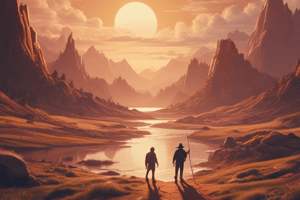Podcast
Questions and Answers
What are movies also known as?
What are movies also known as?
Films
Who were some pioneers in the early days of filmmaking?
Who were some pioneers in the early days of filmmaking?
Thomas Edison and the Lumière brothers
What are some characteristics of the Drama genre in movies?
What are some characteristics of the Drama genre in movies?
Focuses on emotional and psychological aspects of characters' lives, explores human relationships and societal issues
What type of scenes are typically featured in Action movies?
What type of scenes are typically featured in Action movies?
How have movies evolved in the 21st century?
How have movies evolved in the 21st century?
What key role in the filmmaking process involves capturing the visual elements of the film?
What key role in the filmmaking process involves capturing the visual elements of the film?
Which movie genre typically showcases love, heartache, and the challenges of finding a soulmate?
Which movie genre typically showcases love, heartache, and the challenges of finding a soulmate?
How do movies impact society and culture?
How do movies impact society and culture?
What is the main responsibility of an editor in the filmmaking process?
What is the main responsibility of an editor in the filmmaking process?
What makes movies a powerful medium according to the text?
What makes movies a powerful medium according to the text?
Study Notes
Movies: A World of Stories and Entertainment
Movies, also known as films, are visual narratives that blend art, storytelling, and technology to provide a uniquely immersive and captivating experience. For over a century, humans have been captivated by the magic of the silver screen, and it continues to be a powerful medium for communicating ideas, emotions, and stories that transcend borders and languages.
Origin and Evolution
The origins of movies can be traced back to the late 19th century, with pioneers like Thomas Edison and the Lumière brothers experimenting with techniques to capture and project moving images. Early filmmaking relied on silent films, which were later accompanied by live music and, eventually, the introduction of sound and dialogue through innovations like the Vitaphone system. In the 21st century, movies have evolved further with the rise of digital cinema, computer-generated imagery (CGI), and 3D technology.
Genres
Movies can be cataloged into various genres, each with specific characteristics and target audiences. Some popular genres include:
- Drama: Focuses on the emotional and psychological aspects of characters' lives, often exploring human relationships and societal issues.
- Action: Features high-octane stunts, car chases, and intense fight scenes, designed to engage audiences with adrenaline-pumping sequences.
- Romance: Centers on the development and growth of romantic relationships, often showcasing love, heartache, and the challenges of finding a soulmate.
- Science Fiction: Explores futuristic and imaginative concepts, such as alien life, time travel, and advanced technology.
- Comedy: Provides humor and laughter to entertain audiences, covering a range of topics and styles.
- Thriller: Utilizes suspense, mystery, and sometimes horror elements to keep audiences on the edge of their seats.
Production Process
From scriptwriting to casting, filming, and post-production, movies are a labor-intensive medium that requires collaboration among many professionals. Some key roles in the filmmaking process include:
- Director: Oversees the entire filmmaking process, guiding actors, cinematographers, and other crew members to achieve the desired creative vision.
- Screenwriter: Develops the story, dialogue, and narrative structure to create a compelling and engaging film.
- Cinematographer: Responsible for capturing the visual elements of the film, including lighting, composition, and camera movement.
- Editor: Responsible for assembling and fine-tuning the raw footage into a cohesive and engaging final product.
Distribution and Impact
Movies are distributed through various channels, such as theatrical releases, streaming services, and home video. They have an immense impact on society and culture, shaping perceptions, influencing trends, and reflecting the values and concerns of their time. Movies also serve as a vehicle for education, documenting history, and exploring complex topics in an engaging and accessible manner.
Global Reach and Influence
The global reach of movies is vast, with international film festivals, award ceremonies, and the Academy Awards celebrating the best films from around the world. Movies have also become a powerful tool for promoting global awareness, raising funds for charity, and bringing attention to important causes.
In conclusion, movies have the unique ability to transport audiences to new worlds, evoke emotions, and inspire imagination. They have evolved from humble beginnings to a powerful medium that continues to shape culture, influence society, and provide an endless source of entertainment. Whether viewed in theaters or at home, movies will continue to captivate and inspire audiences for generations to come.
Studying That Suits You
Use AI to generate personalized quizzes and flashcards to suit your learning preferences.
Description
Test your knowledge about the origins, genres, production process, distribution, and global influence of movies. Explore the evolution of filmmaking from silent films to digital cinema and learn about the various genres that captivate audiences worldwide.




